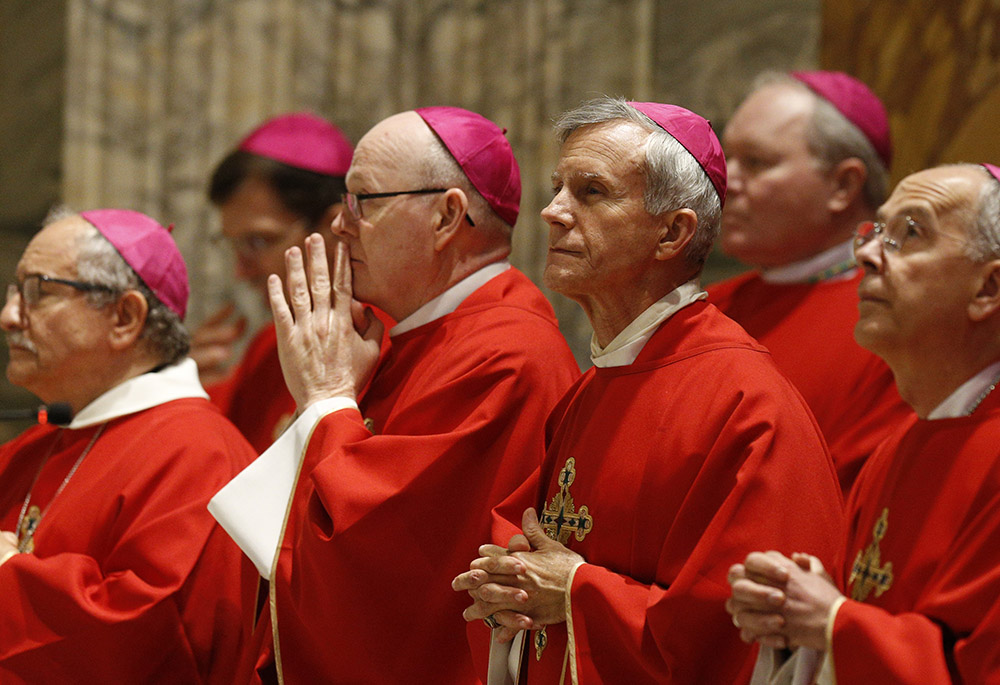
Bishop Joseph Strickland of Tyler, Texas, and other U.S. bishops from Arkansas, Oklahoma and Texas concelebrate Mass Jan. 21, 2020, at the Basilica of St. Paul Outside the Walls in Rome. The bishops were making their "ad limina" visits to the Vatican to report on the status of their dioceses to the pope and Vatican officials. (CNS/Paul Haring)
In a new public letter that echoes the Catholic Church's anti-modernist statements from the late 19th and early 20th centuries, the controversial Bishop of Tyler, Texas, predicts that many of "the basic truths" of the Catholic faith will be challenged during the upcoming October meeting in Rome of the Synod of Bishops on synodality.
Having previously accused Pope Francis of "undermining the Deposit of Faith," Bishop Joseph Strickland warns in his Aug. 22 letter of "the evil and false message" that he said has "invaded" the church.
Strickland also urges his readers to be wary of any "attempts to present an alternative to the Gospel of Jesus Christ," and declares that anyone who resists such changes is not seeking to leave the church.
"Instead, those who would propose changes to that which cannot be changed seek to commandeer Christ's church, and they are indeed the true schismatics," Strickland wrote in his provocative three-page letter, addressed to the Catholics in his diocese.
Appointed by Pope Benedict XVI in 2012 to become the Tyler Diocese's fourth bishop, Strickland in recent years has cultivated the public persona of an outspoken firebrand who does not hesitate to challenge the current pope's leadership or criticize his fellow bishops in public. His leadership of the East Texas diocese is currently the subject of a Vatican investigation, known formally as an apostolic visitation.
In addition to his social media posts questioning Francis' fidelity to the Catholic faith and endorsing videos attacking the current pontiff as a "diabolically disoriented clown," Strickland has questioned the concept of synodality, a historical practice where bishops consult the faithful in communion with the universal church.
Francis has sought to revive synodality. In 2020, the pope announced the Synod of Bishops on synodality, a three-year process of consulting the world's Catholics in advance of gatherings in 2023 and 2024 in Rome of bishops and voting delegates, including lay men and women.
Many of the consultations highlighted issues such as how the church can be a more welcoming space to marginalized people, including LGBTQ Catholics, and can better integrate women into leadership positions, including the possibility of ordained ministry.
Advertisement
While Francis has described synodality as "what God expects of the church in the third millennium," Strickland struck a different note during a radio interview in 2020: "All this synodality is garbage as far as I'm concerned. It just is not living the truth."
In his new letter, Strickland lists seven "basic truths" that encompass official Catholic teachings on sexual morality, the sacraments, redemptive suffering, and the theological claim that only the Catholic Church provides the authentic path to salvation.
"We must hold fast to these truths and be wary of any attempts to present an alternative to the Gospel of Jesus Christ, or to push for a faith that speaks of dialogue and brotherhood, while attempting to remove the fatherhood of God," Strickland wrote.
On the possibility that conservative Catholics will be labeled "schismatics" for disagreeing with proposed changes that could emerge from the synod, Strickland added that "no one who remains firmly upon the plumb line of our Catholic faith is a schismatic."
Strickland outlined his seven "basic truths," and his defenses of them, in a manner consistent with two early 20th-century papal documents that he quoted and posted on X, formerly known as Twitter, the day before the letter's release.
In those documents — "Syllabus Condemning the Errors of the Modernists" and "The Oath Against Modernism" — Pope St. Pius X reiterated traditional Catholic doctrines and sought to defend them against what he saw as errors in some then-emerging philosophical trends and historical-critical approaches to biblical scholarship.
Several other conservative prelates have raised concerns about the synod of synodality. Reflecting longrunning conservative criticisms during Francis' pontificate, Cardinal Raymond Burke claims in the preface of a new book that the pope is risking confusion and even schism in leading the synod.







